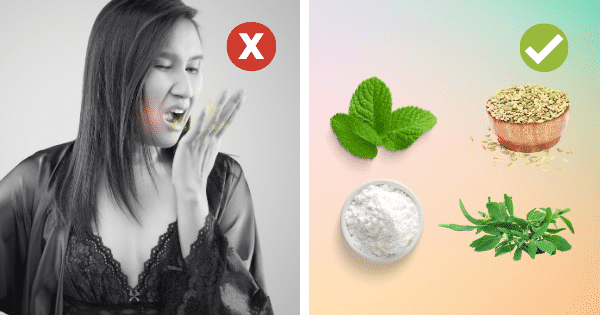Mouth bacteria play a significant role. Global statistics show 35% to 45% experience daily bad breath. Americans invest $10 billion annually in oral care items like mints, gum, and mouthwash.
1. Mint Leaves and Spices: Natural Breath Refreshers
Combatting mouth odor and achieving a refreshing mouth is easily achieved with the natural properties of mint leaves. Similarly, spices like cloves, cardamom, and fennel seeds also exhibit potent abilities to neutralize bad breath. Furthermore, you can harness the benefits of baking soda as an accessible natural mouthwash. Dissolving a teaspoon of baking soda in a cup of water creates an effective rinse, or you can apply wet toothbrush-dipped baking soda for thorough teeth cleaning. Additionally, fenugreek leaf tea emerges as a remarkable antibacterial mouth freshener, offering a perfect start to your day.
2. Hydration’s Multifaceted Benefits: Defending Against Bad Breath
The merits of maintaining hydration extend beyond general health, encompassing the prevention of bad breath as well. Saliva serves as a natural deterrent against bacterial growth, necessitating the efficient operation of salivary glands facilitated by adequate water intake. A fundamental practice in thwarting bacterial buildup and resultant bad breath due to insufficient moisture and saliva within the oral cavity, drinking water is vital. It is imperative to avoid sugary juices, especially at night, which can inadvertently foster bacterial proliferation during nighttime hours.
3. Mindful Eating: Foods Impacting Oral Freshness
Mindful food choices are pivotal in preserving mouth freshness, with certain items bearing the potential to induce bad breath best avoided. While onions and garlic stand as common culprits, moderation is key as research demonstrates that limited onion consumption successfully eliminates four distinct bacterial strains implicated in tooth decay and gum disease. Similarly, foods rich in fructose or acidic components should be steered clear of, given their propensity to foster bacterial growth. Opting for hunger-quelling options such as apples or yogurt proves beneficial; apples’ heteropolysaccharide pectin encourages saliva production, while yogurt’s active cultures aid in reducing oral bacteria.
4. Tongue Care: Tackling Bacterial Buildup for Freshness
Elevate your oral hygiene routine by addressing bacterial accumulation on the tongue, a potential breeding ground for foul-smelling microorganisms. In tandem with tooth brushing, employ your toothbrush as a tool to scrape away bacteria, byproducts, and plaque from the tongue’s surface. Alternatively, a specialized tongue scraper can serve the same purpose, enhancing your overall oral care regimen.
5. Comprehensive Dental Regimen: Two-Minute Brushing and Flossing
Elevate your dental care regimen by committing to a comprehensive routine. Devote two minutes, twice a day, to thorough tooth brushing, and supplement this with consistent flossing. Alarming statistics reveal that merely a little over 55% of women adhere to twice-daily brushing, while the corresponding percentage for men is even lower, standing at just 49%. These practices synergistically eliminate trapped food particles and odor-causing bacteria, culminating in a pristine oral environment.
6. Gum Health and Smoking: Impact on Bad Breath
Emanating from the base of teeth, pockets serve as breeding grounds for mouth bacteria. Recognizing the nexus between gum diseases and bad breath, prioritizing gum health becomes imperative. Opt for fluoride-containing toothpaste to fortify your gums. Likewise, renounce smoking, as this habit impairs immune function and significantly correlates with gum-related afflictions. Smoking not only exacerbates gum damage but also impedes the healing process following injury.
7. Citrus Fruit Peels: Dual-Action Freshness Enhancers
Elevate your breath-freshening approach by incorporating citrus fruit peels, such as lemon or orange, into your oral care regimen. A pre-chewing rinse of the peel ushers in both a burst of freshness and a surge in citric acid, effectively stimulating salivary glands for heightened saliva production. This natural mechanism functions as a formidable defense against bad breath and plaque acids that precipitate tooth decay, solidifying the role of citrus peels as a dual-action solution.
Ready to embrace these strategies for a consistently fresh smile and no mouth bacteria? Which approach will you try first? Let us know in the comments.









No mention of the necessity of flossing to get food out. Most people just let the food build up and rot out of inbetween their teeth.